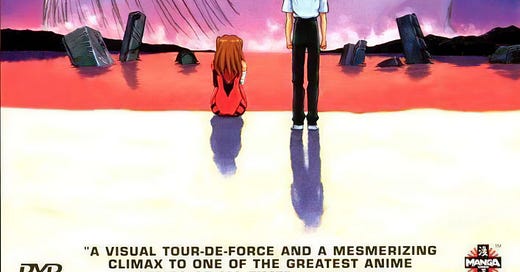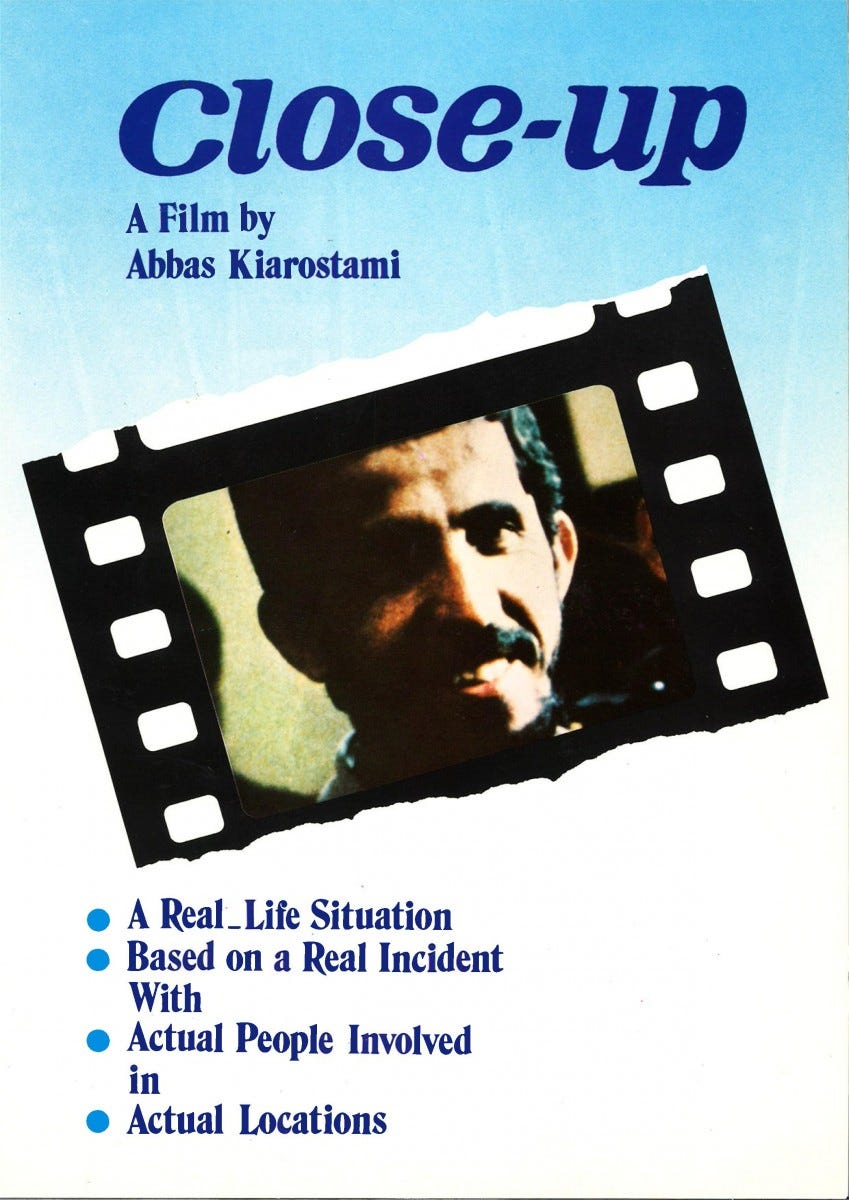Hideaki Anno and Kazuya Tsurumaki's The End of Evangelion (1997)
The End of Evangelion, much like the Neon Genesis Evangelion TV series it follows on from, collapses all borders of stability. Is this a film or just an extension of the TV series? Are the characters good or bad? What is the reality of the world we are shown? Why are we alive, and should we be?
The movie can’t be explained without first elaborating on the TV show, which seemingly follows a typical anime premise - children on the verge of puberty are tasked with piloting gigantic, weaponised robots in a fight to protect a futuristic Tokyo against extraterrestrial threats. Shinji Ikari is the 14 year old protagonist, one of the pilots of these robots called Eva (short for Evangelion), a task which he finds overwhelming, and deepens his intense social phobias and depression. These painful chasms of the mind are where series creator and End of Evangelion co-director Hideaki Anno focused the TV storyline, occasionally delivering on the blockbuster action but frequently eschewing it, twisting it up, and throwing intense, formless existential dread straight at viewers instead. The important battles of Evangelion take place internally, in the self. This is powerfully realised through the synchronisation needed by Eva pilots - they sit in small vessels placed inside the robot’s heads where their egos meld into a dual-physical form, being both themselves and the Eva at once.
The show had became more and more abstract each episode, culminating in a finale outside of any narrative or stylistic comprehension; an exploding series of decaying images surging freely between stills, various animations, live action and text, finally concluding with Shinji finding the will to live and accept the terror of existence, this realisation seemingly connected with the salvation of the earth from impending apocalypse. The only film I’ve seen that could even point to this ending is the cosmic spiritualism at the end of 2001: A Space Odyssey, but Evangelion is like that with the history of multimedia art and teenage angst mixed in. It is truly, truly unlike anything you have ever seen. This ending was strongly divisive due to its lack of conventional resolution, so The End of Evangelion was created as a new, alternate ending. Instead of relenting to mainstream desires though, Anno doubled down, providing the most upsetting outcome possible while also decaying the structure into a similar jumbled, philosophical approach as the original.
In Willow Catelyn Maclay’s excellent series for MUBI Notebook, she describes The End of Evangelion, as fans wanting “closure… and a grander sense of finale instead of the abstract untangling of the psychological state of the lead character. These fans wanted blood and combat and death. They wanted the end of the world, and they would be given that with more apocalyptic fallout than they likely ever considered.” The End of Evangelion starts with our supposed hero Shinji totally dejected and deplorably masturbating over his unconscious colleague in a hospital bed, a representation of his failure to connect with others. This solidifies his extreme self-pity and disdain, while also shattering any goodwill the audience had for him. We barely see his face for the film as he’s too disgusted with himself to look up. From this opening, we then see almost all the characters of the show violently killed. This is before the annihilation of the entire human race even begins.
Although Anno’s protege Kazuya Tsurumaki co-directed this film, all of Evangelion is truly Anno’s auteur vision, and the deep despair which runs through it is his own. The end game of the series where Shinji finds purpose in a greater good, albeit with great difficultly, was a mirror held up to Anno himself, grappling with his own mental health. It was also an attempt at trying to critique “otaku” culture; a group consisting almost entirely of young men who reject the real, outside world to spend their lives isolated, watching anime inside. Anno identified with the otakus and, through a medium they loved, he challenged himself and this group to find a reason to live alongside others, however difficult that may be. Sadly, he ended up creating a toxic fan base who sent him death threats because of their frustration at the original, non-linear conclusion.
The otakus could find a hero in the Shinji from the series, his reluctance and trauma their own, and through his pain he eventually finds himself. It was a story of hope. Not a shred of heroism is found in this Shinji - the film essentially happens to him while he stumbles through it, lifeless. In the book 100 Anime, Philip Brophy notes that “In the West, we will crudely designate the hero, the buffoon, the cynic, the sage; in the East, characters are founded upon their schizophrenia, established through their multiplicity and defined by their inability to be grounded… Evangelion’s characters are quintessentially good, bad and ugly. Their visage and voice dance intricately orchestrated lines that map out these characters not as containers or vessels of emotion, but shimmering and shifting apparitions of emotional complexity… unrefined as the prickly irrationality which dictates our everyday exchanges.” This take on Shinji isn’t out of nowhere, but delves deeper into his fractured psyche which was there all along. The fans didn’t know what they wanted, and Anno was here to remind them of the dark, ugly heart within both Shinji and ourselves. It’s the fans cruelty that birthed this vision. Later on, as The End of Evangelion deconstructs itself, it takes the perspective of a cinema screen, live action and presumably the implicit space where we are, turning the lens back at us. The film is not about Shinji, it’s a self-reflexive story of watching and being. It’s about us.
In it’s fractured approach, disregard for conventional coherence, and striking images in the service of philosophical musings, The End of Evangelion often feels like a hyper-contemporary, visual poem as much as it’s a film or a television series. Rae Armantrout was an American poet who wrote about her idea of “Poetic Silence” in the mid 1980s, listing one possible way of creating impact and reflection by “us[ing] anything which places the existent in perceptible relation to the non-existent, the absent or outside.” This is what The End of Evangelion does, collapsing existence and non-existence, inside and outside, non-perceptible and highly perceptible, fiction and audience. Maclay says in her MUBI piece that “Both of [Evangelion’s] endings represent two sides of the same coin… and both are honest.” It’s this honesty that shines through all the complexity. Even under totally different circumstances, we end up in almost the same place; we still don’t have our questions answered, we simply have to keep on going with life until we don’t anymore.
The End of Evangelion, and the Neon Genesis Evangelion TV series, are available to stream online via Netflix.
Next Friday - Abbas Kiarostami’s Close Up (1990). Sadly, this film isn’t available to stream online.




